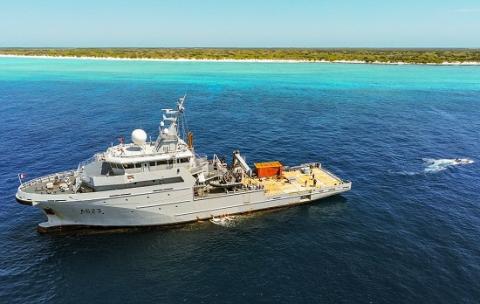
Mission Bougainville: "I'm motivated by the unprecedented prospect of contributing to scientific research".
After six months' experience in the Arctic, Corentin at 23 yrs. old, a marine biology graduate from Sorbonne University, is preparing for the challenges of a year at sea with the Bougainville Mission.
Corentin will be based in Noumea, working in pairs with Caroline.
Can you tell us about your background?
Corentin: I've just finished my Master's in Marine Sciences at Sorbonne University. My studies were driven by my passion for the oceans and marine biodiversity. After a bachelor's degree in Earth and Life Sciences and an internship at Ifremer in Brest, I decided to do a master's degree in Marine Biology. I was able to follow various courses at Sorbonne University's marine stations. I then spent six months doing my Master's thesis in Svalbard in the Arctic.
What motivated you to apply for the Bougainville Mission and how did you discover this opportunity?
C.: I was mainly motivated by the novel prospect of contributing to scientific research. After attending the presentations given by the various people involved in the mission, I also had the opportunity to talk to the VOAs from the first class. These exchanges encouraged me to pursue this project. I was impressed by their enthusiasm for the year they were living, especially when they emphasized essential aspects such as communication, sharing and the opportunity to work in a unique and dynamic environment.
The mission is being carried out in collaboration with the French Navy.What do you expect from this unique experience of working aboard Navy ships?
C.: It's the perfect opportunity to observe how scientific research can be integrated into Navy operational missions, or on other ships not dedicated to research.
This experience will also enable me to develop my communication and teamwork skills, by learning to combine scientific and military expertise. I'm convinced that this year will enrich not only my technical and scientific skills, but also my interpersonal skills, while strengthening my ability to adapt and make decisions quickly.
How are you preparing to take on scientific responsibilities with full autonomy during the mission?
C.: To prepare ourselves, we took two scientific training courses in Banyuls-sur-Mer and Villefranche-sur-Mer. These training sessions, which took place over the summer, gave us the opportunity to meet the various players with whom we'll be collaborating remotely, as well as the other VOAs selected.
We were also able to familiarize ourselves with the equipment and tools we'll be using throughout the year. Learning about the various data acquisition techniques and having the opportunity to discuss them in person with the other VOAs and researchers involved, before we were all scattered to the four corners of the globe, was excellent preparation.
What challenges do you anticipate during this mission and how do you plan to overcome them?
C.: I'd say the main challenge will be adapting to life at sea over a long period of time. Although I've already been on several missions, none have lasted more than two weeks!
To overcome this, I'll be relying on the advice of the previous class, as well as the cohesion of the crew.
On the scientific front, another challenge will be to manage the uncertainty and unforeseen events associated with data collection. To cope with this, I'll be drawing on the training courses I've taken this summer, and I'll be trying to keep in touch as much as possible with the other VOAs, who will probably be facing the same difficulties as me, despite the distance, to ensure the reliability of the data collected.
How do you think this mission will enrich your career and your personal development?
C.: This mission represents an invaluable opportunity to strengthen my skills in oceanographic research, communication and project management. It will enable me to work closely with scientists, sailors and other experts, which will broaden my professional network and open up opportunities for future projects. At the same time, the responsibilities associated with my VOA role will help develop my leadership skills.
What skills do you hope to acquire or develop during this assignment?
C.: I want to deepen my expertise in planktonic marine biodiversity and scientific research, while acquiring skills specific to the French Navy's environment.
I'd also like to develop my skills in managing teamwork in a setting as demanding as that of an embarked mission.Working with specialists from different fields will be a great opportunity to strengthen my ability to adapt and communicate in multidisciplinary contexts.
Have you ever thought about what you might do after Bougainville?
C.: I'd like to continue on the research path, of course. One prospect that particularly appeals to me is that of returning to the Arctic. Returning to this region would enable me to continue exploring the major scientific issues linked to this fragile environment, and why not consider extending the work of the Bougainville Mission to this part of the globe.





